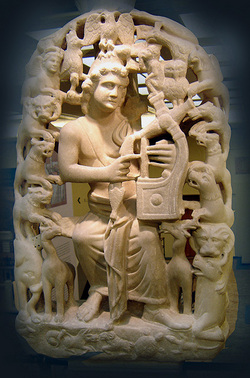ORPHEUS

Orpheus and wild beasts, Byzantine relief.
George Robert Stowe Mead
Orpheus (1896)
It would be too tedious to recite here the various glosses of the Orphic legend, or to enter into a critical examination of its history. On the whole the legend has been preserved with sufficient fidelity in the recitals of the poets and the works of mythographers, and the general outlines of it are sketched as follows by P. Decharme in his Mythologie de la Grece Antique (pp. 616 sq.).
Orpheus was son of Giagrus, King of Thrace, and Calliope, one of the Muses. He was the first poet and first inspired singer, and his whole life is the history of the results of divine harmony. Lord of the seven-stringed lyre, all men flocked to hear him, and wild beasts lay peacefully at his feet; trees and stones were not unmoved at the music of his heavenly instrument. The denizens of the unseen world and the princes of Hades rejoiced at the tones of his harp. Companion of the Argonauts in their famous expedition, the good ship Argo glides gently over the peaceful sea at the will of his magic strains; the fearsome moving rocks of the Symplegades, that threatened Argo with destruction, were held motionless; the dragon of Colchis that watched the golden fleece was plunged in sleep profound.
His master was Apollo; Apollo taught him the lyre. Rising in the night he would climb the heights of Pangseus to be the first to greet the glorious god of day.
But great grief was in store for the singer of Apollo. His beloved wife Eurydice, while fleeing from the importunities of Aristseus, was bitten by a serpent hidden in the grass. In vain the desperate husband strove to assuage the pain of his beloved, and the hills of Thrace resounded with his tuneful plaints. . . Eurydice is dead. . . In mad distraction he determines to follow her even to Hades, and there so charms the king of death that Eurydice is permitted to return to earth once more—but on one condition—Orpheus must not look back. And now they had almost recrossed the bounds of death, when at the very last step, so great is his anxiety to see whether his dear wife is still behind him, that he turns to gaze, and Eurydice is instantly reft from his sight (Virgil, Geor., iv. 499):
"ex oculis subito ceufumus in auras commixtus tenues, fugit diversa;"
"quick from his eyes she fled in every way, like smoke in gentle zephyr disappearing."
The death of Orpheus is variously recounted. Either he died of grief for the second loss of Eurydice, or was killed by the infuriated Bacchanals, or consumed by the lightning of Zeus for revealing the sacred mysteries to mortals. After his death the Muses collected his torn members and buried them. His head and lyre were carried by the waves to Lesbos.
Source: George Robert Stowe Mead, Orpheus (London: Theosophical Publishing, 1896).
Photo Credit: Ricardo André Frantz / Wikimedia Commons.



